
The large chequered skipper is a species of butterfly in the family Hesperiidae. It is the single member of the monotypic genus Heteropterus. The species can be found in isolated populations in Europe and east across the Palearctic to Central Asia and Korea. It is endangered in the Netherlands.

The Cinquefoil Skipper is a species of skipper butterfly.
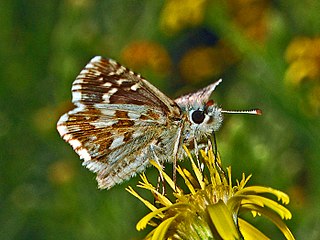
The rosy grizzled skipper is a species of skipper.
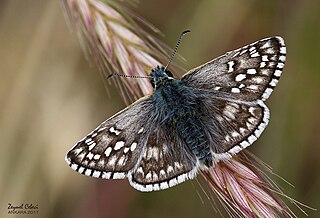
Pyrgus sidae, the yellow-banded skipper, is a species of skipper. It is found in from the Iberian Peninsula through southern and eastern Europe, southeast France, the northwestern coastal areas of central Italy, then Istria and the Balkan peninsula, across Turkey, Transcaucasia, to Iran and Afghanistan. East of the Southern Ural mountains the range extends to northwest Kazakhstan and the west of the Tien Shan in the north.
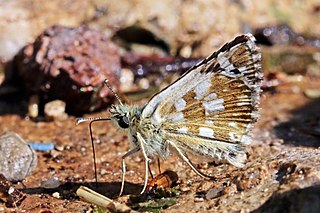
The sandy grizzled skipper is a species of skipper. It has a restricted range in southeastern Europe with a small relict population in central Spain.

Erebia epistygne, the spring ringlet, is a species of butterfly in the family Nymphalidae. It is found in France and Spain. Its natural habitat is temperate grassland.
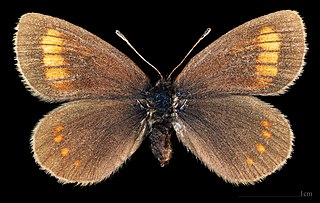
Erebia pharte, the blind ringlet, is a butterfly of the family Nymphalidae. It is an Alpine butterfly.
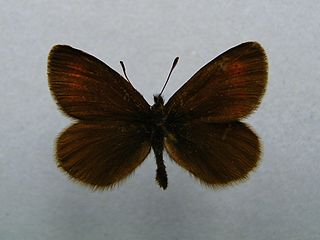
The Eriphyle ringlet is a member of the subfamily Satyrinae of family Nymphalidae. It is a high mountain butterfly found in the Alps.Wheeler (1903) gives a short description

The sooty ringlet is a member of the subfamily Satyrinae of family Nymphalidae. It is a high-altitude butterfly found in the Alps and Apennine Mountains on heights between 1,900 and 3,000 meters in Austria, Germany, France, Switzerland, Italy and Slovenia.

The water ringlet is a member of the subfamily Satyrinae of family Nymphalidae. It is a high altitude butterfly found in the Alps, Bavaria, Styria, Pyrenees, Carpathians and Bulgaria.

Orthosia incerta, the clouded drab, is a species of moth of the family Noctuidae, found in Europe and Asia. The occurrence of the species extends through all European countries through the Palearctic to the Russian Far East and Japan. It is absent from northern Fennoscandia and in the Alps it occurs up to 2000 m above sea level.

Aricia nicias, the silvery argus, is a butterfly of the family Lycaenidae. It is found in the Alps, Pyrenees and from Scandinavia ranging to Siberia and the north of Mongolia.

Polyommatus damon, the Damon blue, is a butterfly of the family Lycaenidae.
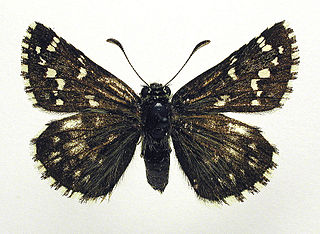
The northern grizzled skipper is a Holarctic species of skipper butterfly with a range in North America from the subarctic to the north, New Mexico to the south, and the Appalachian Mountains to the east.In the Palearctic the species which was described from Norway is distributed across Scandinavia and the northern part of European Russia across the Urals through northern Asia to the Altai.

Favria is a monotypic genus of spread-wing skippers in the butterfly family Hesperiidae. This genus was formerly a synonym of Muschampia, and its only species, Favria cribrellum, was formerly a member of Muschampia. The species is commonly known as the spinose skipper.
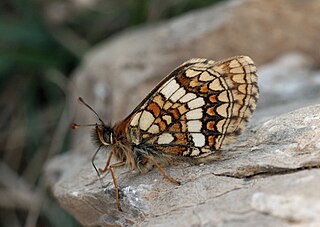
Melitaea varia, the Grisons fritillary, is a butterfly of the family Nymphalidae. It is found in the Alps at heights of 1,500–2,600 m (4,900–8,500 ft), especially in the Swiss cantons Valais, Engadin and Graubünden. It is also found in the Ortler region in South Tyrol, Alpes-Maritimes and Drôme in France, high areas of Tirol in Austria and high areas in the Apennine Mountains such as Abruzzo.

Muschampia proto, the sage skipper, is a butterfly of the family Hesperiidae. It is found in Morocco, Algeria, the Iberian Peninsula and southern France.

Muschampia tessellum, the tessellated skipper, is a butterfly of the family Hesperiidae. It is found from the southern Balkan Peninsula through Ukraine, southern Russia and Asia Minor, southern Siberia, Mongolia, east to the Amur region.
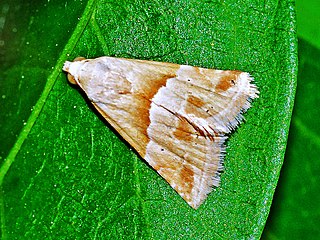
Eublemma parva, the small marbled, is a moth of the family Erebidae. The species was first described by Jacob Hübner in 1808.
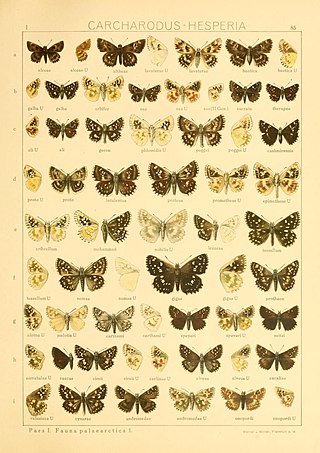
Pyrgus speyeri is a small butterfly found in the East Palearctic that belongs to the skippers family.




















